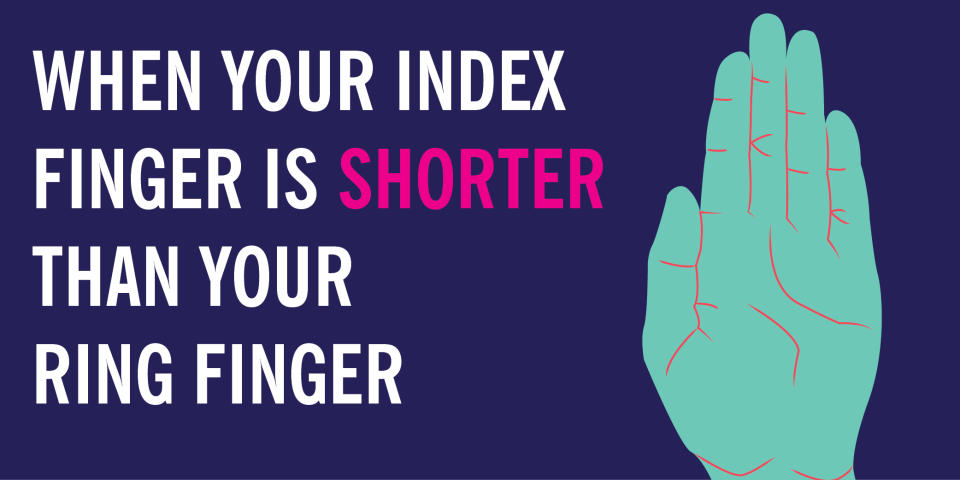8 Things Your Finger Length Could Say About You

As much fun as it is to have your palm read, most people know that the practice is basically B.S. But there could be other secrets hiding in your hands: See, researchers have long known that relatively high levels of exposure to testosterone (the male sex hormone) in the womb can slow the growth of your index fingers, leaving you with a greater difference in length between your index and ring fingers (i.e. digit ratio). It’s why guys often have a greater difference in digit ratio - women, who tend to be exposed to less testosterone and more of the female hormone estrogen in the womb, usually have less of a difference in length between those fingers.
Among animals, “testosterone exposure very early in life has permanent effects on adult behavior,” according to Johannes Honekopp, a senior psychology lecturer at Northumbria University in England, who researches digit ratio. It’s why there’s reason to believe the same thing holds true for humans, and researchers have spend years searching for proof.
While Honekopp thinks the links between finger length and personality are “absent or so minuscule that they are practically irrelevant,” other scientists who continue to search for meaning in human hands have uncovered some ~intriguing~ associations. Here’s what they’ve uncovered about humans’ relative finger length and their behaviors, so far:

These traits correlate to extra testosterone exposure during development. The shorter your index finger is compared to your ring finger, the greater your exposure.
1. You excel in endurance activities. Women with extra in vitro exposure to testosterone end up faster in endurance sports like long-distance running compared to women with less testosterone exposure, according to Honekopp, who calls the association “pretty strong.”
2. Your math, pong, puzzle, and Rubik’s cube game is on point. In the course of his research on differences in brain function among males and females, Carl Pintzka, a doctor and researcher at The Norwegian University of Science and Technology (NTNU), measured women’s fingers and gave them testosterone drops or a placebo before testing them on tasks like navigating a 3-D environment and predicting what a shape would look like if it were turned around:

Women given real testosterone drops fared better at these basic spatial exercises, suggesting those who are naturally exposed to higher levels of testosterone in the womb could have a leg up in similar tasks IRL - including ones that call for basic arithmetic, since your ability to crunch numbers relies on spatial skills.
3. You’re less likely to be faithful to one partner. Greater exposure to testosterone in the womb predicts sexual promiscuity, according to a study published in Biology Letters in which researchers compared 575 adults’ attitudes about sex to their finger lengths.
4. You’re more likely to be attracted to other women. In a University of California at Berkley study in which researchers assessed the hands of 720 men and women and asked them about their sexual orientation and birth order, women who self-identified as lesbians were more likely to have a greater difference between the length of their index and ring finger.

This trait correlates to lower levels of testosterone exposure during development.
5. You’re a serial monogamist. Most evolutionary biologists believe that females favor monogamy because their offspring are more likely to survive when their mate sticks around. So it makes sense that researchers involved in the Biology Letters study found that women exposed to more female hormones are more into long-term relationships than women exposed to more male hormones, who may be more likely to date around.
6. Your memory is A+. Research suggests that people with lower levels of testosterone tend to excel at tasks that require them to remember things, one reason why you might be the one to remember to restock the milk after your partner mentions he’s finished the carton.
7. You’re at greater risk for anxiety and depression. Exposure to more female hormones in the womb increases your risk of diseases that most typically plague women, Pintzka explained in a press release on his research.
8. You’re more likely to be married. In a 2000 paper published in the medical journal Evolution & Human Behavior, researchers reported that English women whose hands indicated they’d been exposed to less testosterone in the womb were more likely to be married, suggesting a sort of biological preference among men for women with more female characteristics.
Get all the ~FiTsPiRaTiOn~ directly in your feed. Follow Facebook.com/CosmoBod.
Follow Elizabeth on Twitter and Instagram.
You Might Also Like


